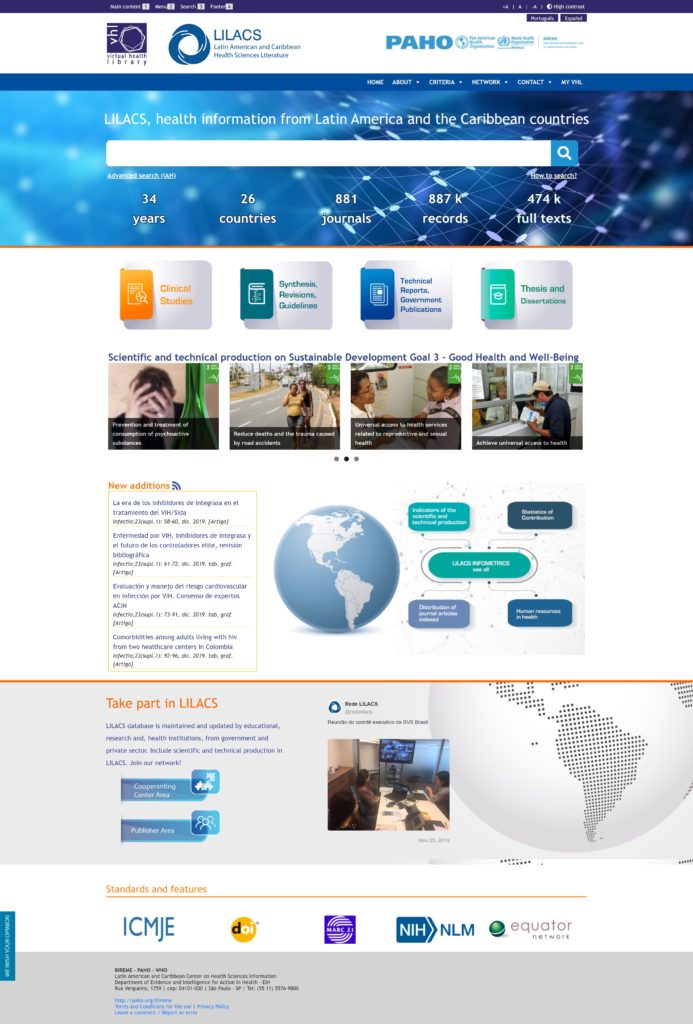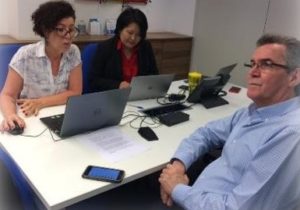On October 29th, 2019, LILACS – Latin American Literature on Health Sciences – celebrated its 34th anniversary with several actions that culminated in the virtual launch of its new portal, with great participation of professionals from Latin America and the Caribbean.
 New information architecture and graphic design were developed to highlight LILACS principles, such as: networking and local capacity building, public health priorities, latest publications, news and innovations by BIREME based on the LILACS methodology; in addition, accessibility tools have been implemented for people with partial or total disabilities.
New information architecture and graphic design were developed to highlight LILACS principles, such as: networking and local capacity building, public health priorities, latest publications, news and innovations by BIREME based on the LILACS methodology; in addition, accessibility tools have been implemented for people with partial or total disabilities.
The definition of contents was performed in a participatory manner, and the team of production of information sources and cooperative information services contributed to this task.
Also highlighted was the participation of the LILACS and VHL networks in the choice of the LILACS motto, an action developed through voting, defining itself as: “Health information from Latin America and the Caribbean”, which is already displayed on the banner in the portal and in all LILACS promotional material.
The public consultation on the new criteria for selection and permanence of journals in LILACS also took place in two stages: the first with the entire BIREME team and the national and thematic coordinators of the LILACS network, and the second with the participation of all professionals from the LILACS and VHL networks, editors of health scientific journals and professionals involved with matters related to scientific communication.
Other piece of content highlighted on the portal is the infometrics area, which aims to make visible all the infometric analyses performed by BIREME with LILACS as a source of information, and a new data visualization was published, with statistics of the network’s contribution to the LILACS database.
 Preconfigured research strategies have been created for more relevant study project types and priority issues, such as the Sustainable Development Goal 3 in the Agenda 2030, as a service to aid users.
Preconfigured research strategies have been created for more relevant study project types and priority issues, such as the Sustainable Development Goal 3 in the Agenda 2030, as a service to aid users.
Finally, the LILACS methodology is based on international standards, which were highlighted to raise awareness of its most important milestones.
 According to Verónica Abdala and Sueli Suga, both from the department of Information Sources Management at BIREME, the launch of the new portal is an important milestone to highlight LILACS again as the main database that gives visibility to the scientific production of Latin America and the Caribbean.
According to Verónica Abdala and Sueli Suga, both from the department of Information Sources Management at BIREME, the launch of the new portal is an important milestone to highlight LILACS again as the main database that gives visibility to the scientific production of Latin America and the Caribbean.
For his part, Dr. Diego González, director of BIREME, emphasized the pride that this represents for the Pan American Health Organization and its specialized center BIREME; that is, the fact that they can celebrate an uninterrupted 34-year database that counts on active participation from their collaboration networks. “It’s an effort built by many hands, which we must preserve for many more years.”